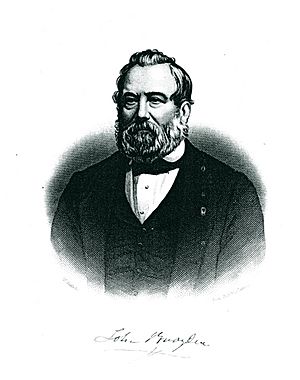John Brogden (industrialist) facts for kids
Quick facts for kids
John Brogden
|
|
|---|---|

John Brogden – Industrialist
|
|
| Born | 2 February 1798 Clitheroe, Lancashire, UK
|
| Died | 9 December 1869 Sale, Cheshire, UK
|
| Nationality | British |
| Occupation | Railway contractor, iron and coal master |
John Brogden (born February 2, 1798 – died December 9, 1869) was a very important person during the Industrial Revolution. He was a successful businessman who built railways and mined iron and coal. He started a company called John Brogden and Sons with four of his five sons.
Contents
Early Life and Education
John Brogden was born on February 2, 1798. His family lived on a farm near Clitheroe in Lancashire, England. He grew up there and went to Clitheroe Grammar School.
Starting a Business Empire
When John was a young man, he moved to Manchester, which was a fast-growing city. Instead of working in the busy cotton factories like many others, John preferred working outdoors. He loved horses and riding, so he started a business focused on moving goods and collecting waste. He even worked with Joseph Whitworth, using his special machines for cleaning. John also started this kind of business in Westminster, London.
In 1838, John Brogden's company won big contracts. They were hired by the Manchester and Leeds Railway Company to build their station in Manchester (which is now Manchester Victoria station). They also built a large bridge, called a viaduct, from the station to Miles Platting.
John Brogden and Sons Company
As his four oldest sons grew up, they joined their father's business. This is when the company officially became John Brogden and Sons. They started to expand into new areas.
The family bought rights to mine iron in a place called Furness. They quickly realized that to get the iron out, they needed a railway. So, they pushed for the Ulverston and Lancaster Railway. This railway was a huge project because it had to cross Morecambe Bay! It was a very challenging and risky idea, but it was approved in 1851. The railway was finally finished in 1857 and was later bought by the Furness Railway.
From 1853, the Brogden family expanded even more. They bought mining rights and an iron factory in South Wales, in the Llynfi and Ogmore Valleys. They worked hard to develop these areas, building another railway in the Ogmore Valley and a new harbor at Porthcawl.
Family Life
In 1822, John Brogden married Sarah Hannah McWilliams. She was the only daughter of Alexander McWilliams. Sarah had gone to school at the Moravian School in Dukinfield.
John Brogden was a Methodist from a young age. Throughout his life, he gave a lot of his time and money to Methodist churches and other good causes. His family also followed the Methodist faith.
John Brogden's Children
John and Sarah had several children who played roles in the family's story:
- John Brogden Junior (born 1823) joined the family business. He sadly died young in 1855 at age 32.
- Alexander Brogden (born 1825) also worked in the family company. He passed away in 1892.
- Henry Brogden (born 1828) was another son who joined the business. He lived until 1913.
- James Brogden (born 1832) spent most of his adult life in Mid-Glamorgan, Wales, working on the family's projects there. He died in 1907.
- George William Hargreaves Brogden (born 1842) was the only son who did not join his father's business. He died in 1892.
- Sarah Hannah (born 1834) married Samuel Budgett in 1858. She died in 1905.
- Mary Jane, also called Jenny, married William Billing in 1867.
Death and Legacy
John Brogden Senior passed away at his home in Sale, Cheshire, on December 9, 1869.
In his will, John left his business to his sons Alexander, Henry, and James. He also set up a trust fund for his daughter Mary Billing. After his death, the business faced some challenges. The company, Brogdens, eventually ran into financial trouble in 1880. This led to a legal case where Mary Billing sued the trustees of her fund to get her money back. The case was decided in 1888, and one of the trustees, Samuel Budgett, had to pay back the missing money himself.
Even with these difficulties, John Brogden's legacy as a pioneer in railway and mining industries remained important. His work helped connect different parts of Britain and supported the growth of industries during a time of great change.
Sources
- Online
- Online
 | Audre Lorde |
 | John Berry Meachum |
 | Ferdinand Lee Barnett |

